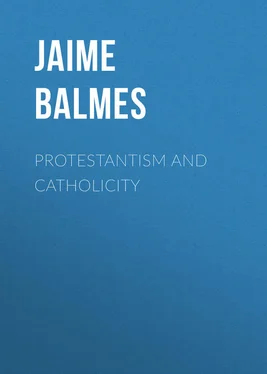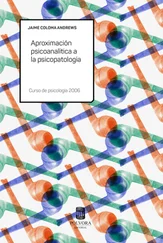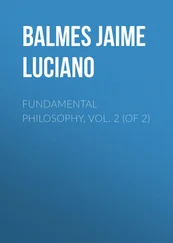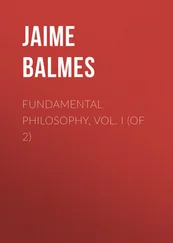Jaime Balmes - Protestantism and Catholicity
Здесь есть возможность читать онлайн «Jaime Balmes - Protestantism and Catholicity» — ознакомительный отрывок электронной книги совершенно бесплатно, а после прочтения отрывка купить полную версию. В некоторых случаях можно слушать аудио, скачать через торрент в формате fb2 и присутствует краткое содержание. Жанр: foreign_antique, foreign_prose, на английском языке. Описание произведения, (предисловие) а так же отзывы посетителей доступны на портале библиотеки ЛибКат.
- Название:Protestantism and Catholicity
- Автор:
- Жанр:
- Год:неизвестен
- ISBN:нет данных
- Рейтинг книги:3 / 5. Голосов: 1
-
Избранное:Добавить в избранное
- Отзывы:
-
Ваша оценка:
- 60
- 1
- 2
- 3
- 4
- 5
Protestantism and Catholicity: краткое содержание, описание и аннотация
Предлагаем к чтению аннотацию, описание, краткое содержание или предисловие (зависит от того, что написал сам автор книги «Protestantism and Catholicity»). Если вы не нашли необходимую информацию о книге — напишите в комментариях, мы постараемся отыскать её.
Protestantism and Catholicity — читать онлайн ознакомительный отрывок
Ниже представлен текст книги, разбитый по страницам. Система сохранения места последней прочитанной страницы, позволяет с удобством читать онлайн бесплатно книгу «Protestantism and Catholicity», без необходимости каждый раз заново искать на чём Вы остановились. Поставьте закладку, и сможете в любой момент перейти на страницу, на которой закончили чтение.
Интервал:
Закладка:
The mind, when contemplating European civilization, experiences so many different impressions, is attracted by so many objects that at the same time claim its attention and preference, that, charmed by the magnificent spectacle, it is dazzled, and knows not where to commence the examination. The best way in such a case is to simplify, to decompose the complex object, and reduce it to its simplest elements. The individual, the family, and society ; these we have thoroughly to examine, and these ought to be the subjects of our inquiries. If we succeed in fully understanding these three elements, as they really are in themselves, and apart from the slight variations which do not affect their essence, European civilization, with all its riches and all its secrets, will be presented to our view, like a fertile and beautiful landscape lit up by the morning sun.
European civilization is in possession of the principal truths with respect to the individual, to the family, and to society; it is to this that it owes all that it is and all that it has. Nowhere have the true nature, the true relations and object of these three things been better understood than in Europe; with respect to them we have ideas, sentiments, and views which have been wanting in other civilizations. Now, these ideas and feelings, strongly marked on the face of European nations, have inoculated their laws, manners, institutions, customs, and language; they are inhaled with the air, for they have impregnated the whole atmosphere with their vivifying aroma. To what is this owing? To the fact, that Europe, for many centuries, has had within its bosom a powerful principle which preserves, propagates, and fructifies the truth; and it was especially in those times of difficulty, when the disorganized society had to assume a new form, that this regenerating principle had the greatest influence and ascendency. Time has passed away, great changes have taken place, Catholicity has undergone vast vicissitudes in its power and influence on society; but civilization, its work, was too strong to be easily destroyed; the impulse which had been given to Europe was too powerful and well secured to be easily diverted from its course. Europe was like a young man gifted with a strong constitution, and full of health and vigor; the excesses of labor or of dissipation reduce him and make him grow pale; but soon the hue of health returns to his countenance, and his limbs recover their suppleness and vigor.
CHAPTER XXI.
OF THE INDIVIDUAL – OF THE FEELING OF INDIVIDUAL INDEPENDENCE ACCORDING TO M. GUIZOT
THE individual is the first and simplest element of society. If the individual is not well constituted, if he is ill understood and ill appreciated, there will always be an obstacle to the progress of real civilization. First of all, we must observe, that we speak here only of the individual, of man as he is in himself, apart from the numerous relations which surround him when we come to consider him as a member of society. But let it not be imagined from this, that I wish to consider him in a state of absolute isolation, to carry him to the desert, to reduce him to the savage state, and analyze the individuality as it appears to us in a few wandering hordes, a monstrous exception, which is only the result of the degradation of our nature. Equally useless would it be to revive the theory of Rousseau, that pure Utopianism which can only lead to error and extravagance. We may separately examine the pieces of a machine, for the better understanding of its particular construction; but we must take care not to forget the purpose for which they are intended, and not lose sight of the whole, of which they form a part. Without that, the judgment we should form of them would certainly be erroneous. The most wonderful and sublime picture would be only a ridiculous monstrosity, if its groups and figures were considered in a state of isolation from its other parts; in this way, the prodigies of Michael Angelo and Raffael might be taken for the dreams of a madman. Man is not alone in the world, nor is he born to live alone. Besides what is he in himself, he is a part of the great scheme of the Universe. Besides the destiny which belongs to him in the vast plan of creation, he is raised, by the bounty of his Maker, to another sphere, above all earthly thoughts. Good philosophy requires that we should forget nothing of all this. It now remains for us to consider the individual and individuality.
In considering man, we may abstract from his quality of citizen, – an abstraction which, far from leading to any extravagant paradoxes, is likely to make us thoroughly understand a remarkable peculiarity of European civilization, one of the distinctive characteristics, which will be alone sufficient to enable us to avoid confounding it with others. All will readily understand that there is a distinction to be made between the man and the citizen, and that these two aspects lead to very different considerations; but it is more difficult to say how far the limits of this distinction should extend; to what extent the feeling of independence should be admitted; what is the sphere which ought to be assigned to purely individual development; in fine, whatever is peculiar to our civilization on this point. We must justly estimate the difference which we find herein between our state of society and that of others; we must point out its source, and its result; we must carefully weigh its real influence on the advance of civilization. This task is difficult; I repeat it, – for we have here various questions, great and important, it is true, but delicate and profound, and very easily mistaken, – it is not without much trouble that we can fix our eyes with certainty on these vague, indeterminate, and floating objects, which are connected together by no perceptible ties.
We here meet with the famous personal independence , which, according to M. Guizot, was brought by the barbarians from the North, and played so important a part, that we ought to look upon it as one of the chief and most productive principles of European civilization. This celebrated publicist, analyzing the elements of this civilization, and pointing out the share which the Roman empire and the Church had therein, in his opinion, finds a remarkable principle of productiveness in the feeling of individuality, which the Germans brought with them, and inoculated into the manners of Europe. It will not be useless to discuss the opinion of M. Guizot on this important and delicate matter. By thus explaining the state of the question, we shall remove the important errors of some persons, errors produced by the authority of this writer, whose talent and eloquence have unfortunately given plausibility and semblance of truth to what is in reality only a paradox. The first care we ought to take, in combating the opinions of this writer, is not to attribute to him what he has not really said; besides, as the matter we are treating of is liable to many mistakes, we shall do well to transcribe the words of M. Guizot at length. "What we require to know," he says, "is the general condition of society among the barbarians. Now it is very difficult, now-a-days, to give an account of it. We can understand, without too much trouble, the municipal system of Rome, and the Christian Church; their influence has continued down to our times; we find traces of them in many institutions and existing facts. We have a thousand means of recognising and explaining them. The manners, the social condition of the barbarians, have entirely perished; we are compelled to divine them, by the most ancient historical documents, or by an effort of imagination."
What has been preserved to us of the manners of the barbarians is, indeed, little; this is an assertion which I will not deny. I will not dispute with M. Guizot about the authority which ought to belong to facts which require to be filled up by an effort of the imagination, and which compel us to have recourse to the dangerous expedient of divining. As for the rest, I am aware of the nature of these questions; and the reflections which I have just made, as well as the terms which I have used, prove that I do not think it possible to proceed with rule and compass in such an examination. Nevertheless, I have thought it proper to warn the reader on this point, and combat the delusion into which he might be led by a doctrine which, when fully examined, is, I repeat it, only a brilliant paradox. "There is a feeling, a fact," continues M. Guizot, "which it is above all necessary to understand well, in order to represent to ourselves with truth what a barbarian was: this is, the pleasure of individual independence – the pleasure of playing amid the chances of the world and of life, with power and liberty; the joys of activity without labor; the taste for an adventurous destiny, full of surprises, vicissitudes, and perils. Such was the ruling feeling of the barbarian state, the moral necessity which put these masses of men in motion. To-day, in the regular society in which we live, it is difficult to represent to one's self this feeling, with all the influence which it exercised over the barbarians of the fourth and fifth centuries. There is only one work, in my opinion, in which this character of barbarism is described with all its force, viz. The History of the Conquest of England by the Normans , of M. Thierry – the only book where the motives, the inclinations, the impulses which actuate man in a social state bordering on barbarism, are felt and described with a truth really Homeric. Nowhere do we see so clearly what a barbarian was, and what was his life. We also find something of this, although in a very inferior degree, in my opinion, in a manner much less simple, much less true, in the romances of Mr. Cooper on the American savages. There is in the life of the savages of America, in the relations and feelings which exist in those forests, something which reminds one, to a certain extent, of the manners of the ancient Germans. No doubt these pictures are a little ideal, a little poetical; the unfavorable side of barbarian life and manners is not displayed in all its crudity. I do not speak merely of the evils which these manners produce in the individual social condition of the barbarian himself. In this passionate love of personal independence, there was something more rude and coarse than one would imagine from the work of M. Thierry; there was a degree of brutality, of indolence, of apathy, which is not always faithfully described in his pictures. Nevertheless, when one examines the thing to the bottom, in spite of brutality, coarseness, and this stupid egotism , the taste for individual independence is a noble moral feeling, which draws its power from the moral nature of man: it is the pleasure of feeling himself a man – the sentiment of personality, of spontaneous action in his free development. Gentlemen, it was by the German barbarians that this feeling was introduced into the civilization of Europe; it was unknown to the Roman world, unknown to the Christian Church, unknown to almost all the ancient civilizations: – when you find liberty in the ancient civilizations, it is political liberty, the liberty of the citizen. It is not with his personal liberty that the man is prepossessed, but with his liberty as a citizen. He belongs to an association – he is devoted to an association – he is ready to sacrifice himself for an association. It was the same with the Christian Church: there prevailed a feeling of great attachment to the Christian corporation – of devotion to its laws – a strong desire of extending its empire; the religious feeling produced a reaction on the man himself – on his soul – an internal struggle to subdue his own will, and make it submit to the demands of his faith. But the feeling of personal independence, the taste for liberty showing itself at any hazard, with hardly any other object than its own satisfaction – this feeling, I repeat, was unknown to the Roman and Christian society. It was brought in by the barbarians, and placed in the cradle of modern civilization. It has played so great a part, it has produced such noble results, that it is impossible not to bring it to light as one of the fundamental elements thereof." ( Histoire Générale de la Civilisation en Europe , leçon 2.) This feeling of personal independence, exclusively attributed to a nation – this vague, undefinable feeling – a singular mixture of nobleness and brutality, of barbarism and civilization – is in some degree poetical, and is very likely to seduce the fancy; but, unfortunately, there is in the contrast, intended to increase the effect of the picture, something extraordinary, I will even say contradictory, which excites the suspicion of cool reason that there is some hidden error which compels it to be on its guard. If it be true that this phenomenon ever existed, what was its origin? Will it be said that it was the result of climate? But how can it be imagined that the snows of the north protected what was not found in the ardent south? How comes it that the feeling of personal independence was wanting precisely in those southern countries of Europe, where the feeling of political independence was developed with so much force? and would it not be a strange thing, not to say an absurdity, if these different climates had divided these two kinds of liberty between them, like an inheritance? It will be said, perhaps, that this feeling arose from the social state. But in that case, it cannot be made the characteristic mark of one nation: it must be said, in general terms, that the feeling belonged to all the nations who were in the same social condition as the Germans. Besides, even according to this hypothesis, how could that which was peculiar to barbarism have been a germ, a fruitful principle of civilization? This feeling, which must have been effaced by civilization, could not even preserve itself in the midst thereof, much less contribute to its development. If its perpetuation in some form was absolutely necessary, why did not the same thing take place in the bosom of other civilizations? Surely the Germans were not the only people who passed from barbarism to civilization. But I do not pretend to say that the barbarians of the north did not present some remarkable peculiarity in this point of view; and I do not deny that we find in European civilization a feeling of personality, if I may so speak, unknown to other civilizations. But what I venture to affirm is, that it is little philosophical to have recourse to mysteries and enigmas to explain the individuality of the Germans, and that it is useless to seek in their barbarism the cause of the superiority which European civilization possesses in this respect. To form a clear idea of this question, which is as complicated as it is important, it is first of all necessary to specify, in the best way we can, the real nature of the barbarian individuality . In a pamphlet which I published some time ago, called Observations Sociales, Politiques, et Economiques, sur les Biens du Clergé , I have incidentally touched upon this individuality, and attempted to give clear ideas on this point. As I have not changed my opinion since that time, but, on the contrary, as it has been confirmed, I will transcribe what I then said, as follows: "What was this feeling? Was it peculiar to those nations? Was it the result of the influence of climate, of a social position? Was it perchance a feeling formed in all places and at all times, but which is here modified by particular circumstances? What was its force, its tendency? How far was it just or unjust, noble or degrading, profitable or injurious? What benefits did it confer on society; what evils? How were these evils combated, by whom, by what means, and with what result? These questions are numerous, but they are not so complicated as they appear at first sight; when once the fundamental idea shall be cleared up, the others will be understood without difficulty, and the theory, when simplified, will immediately be confirmed and supported by history. There is a strong, active, an indestructible feeling in the human heart which urges men to self-preservation, to avoid evils, and to attain to their well-being and happiness. Whether you call it self-love, instinct of preservation, desire of happiness or of perfection, egotism, individuality , or whatever name you give to it, this feeling exists; we have it within us. We cannot doubt of its existence; it accompanies us at every step, in all our actions, from the time when we first see the light till we descend into the tomb. This feeling, if you will observe its origin, its nature, and its object, is nothing but a great law of all beings applied to man; a law which, being a guarantee for the preservation and perfecting of individuals, admirably contributes to the harmony of the universe. It is clear that such a feeling must naturally incline us to hate oppression, and to suffer with impatience what tends to limit and fetter the use of our faculties. The cause is easily found; all this gives us uneasiness, to which our nature is repugnant; even the tenderest infant bears with impatience the tie that fastens him in his cradle; he is uneasy, he is disturbed, he cries.
Читать дальшеИнтервал:
Закладка:
Похожие книги на «Protestantism and Catholicity»
Представляем Вашему вниманию похожие книги на «Protestantism and Catholicity» списком для выбора. Мы отобрали схожую по названию и смыслу литературу в надежде предоставить читателям больше вариантов отыскать новые, интересные, ещё непрочитанные произведения.
Обсуждение, отзывы о книге «Protestantism and Catholicity» и просто собственные мнения читателей. Оставьте ваши комментарии, напишите, что Вы думаете о произведении, его смысле или главных героях. Укажите что конкретно понравилось, а что нет, и почему Вы так считаете.












